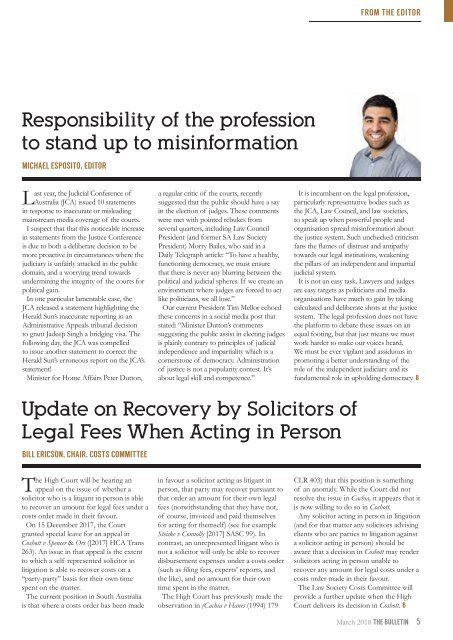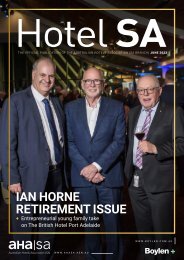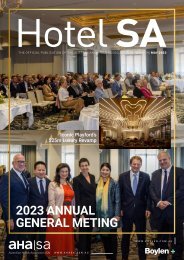LSB March 2018_Web
Create successful ePaper yourself
Turn your PDF publications into a flip-book with our unique Google optimized e-Paper software.
FROM THE EDITOR<br />
Responsibility of the profession<br />
to stand up to misinformation<br />
MICHAEL ESPOSITO, EDITOR<br />
Last year, the Judicial Conference of<br />
Australia (JCA) issued 10 statements<br />
in response to inaccurate or misleading<br />
mainstream media coverage of the courts.<br />
I suspect that that this noticeable increase<br />
in statements from the Justice Conference<br />
is due to both a deliberate decision to be<br />
more proactive in circumstances where the<br />
judiciary is unfairly attacked in the public<br />
domain, and a worrying trend towards<br />
undermining the integrity of the courts for<br />
political gain.<br />
In one particular lamentable case, the<br />
JCA released a statement highlighting the<br />
Herald Sun’s inaccurate reporting in an<br />
Administrative Appeals tribunal decision<br />
to grant Jadeep Singh a bridging visa. The<br />
following day, the JCA was compelled<br />
to issue another statement to correct the<br />
Herald Sun’s erroneous report on the JCA’s<br />
statement!<br />
Minister for Home Affairs Peter Dutton,<br />
a regular critic of the courts, recently<br />
suggested that the public should have a say<br />
in the election of judges. These comments<br />
were met with pointed rebukes from<br />
several quarters, including Law Council<br />
President (and former SA Law Society<br />
President) Morry Bailes, who said in a<br />
Daily Telegraph article: “To have a healthy,<br />
functioning democracy, we must ensure<br />
that there is never any blurring between the<br />
political and judicial spheres. If we create an<br />
environment where judges are forced to act<br />
like politicians, we all lose.”<br />
Our current President Tim Mellor echoed<br />
these concerns in a social media post that<br />
stated: “Minister Dutton’s comments<br />
suggesting the public assist in electing judges<br />
is plainly contrary to principles of judicial<br />
independence and impartiality which is a<br />
cornerstone of democracy. Administration<br />
of justice is not a popularity contest. It’s<br />
about legal skill and competence.”<br />
It is incumbent on the legal profession,<br />
particularly representative bodies such as<br />
the JCA, Law Council, and law societies,<br />
to speak up when powerful people and<br />
organisation spread misinformation about<br />
the justice system. Such unchecked criticism<br />
fans the flames of distrust and antipathy<br />
towards our legal institutions, weakening<br />
the pillars of an independent and impartial<br />
judicial system.<br />
It is not an easy task. Lawyers and judges<br />
are easy targets as politicians and media<br />
organisations have much to gain by taking<br />
calculated and deliberate shots at the justice<br />
system. The legal profession does not have<br />
the platform to debate these issues on an<br />
equal footing, but that just means we must<br />
work harder to make our voices heard.<br />
We must be ever vigilant and assiduous in<br />
promoting a better understanding of the<br />
role of the independent judiciary and its<br />
fundamental role in upholding democracy. B<br />
Update on Recovery by Solicitors of<br />
Legal Fees When Acting in Person<br />
BILL ERICSON, CHAIR, COSTS COMMITTEE<br />
The High Court will be hearing an<br />
appeal on the issue of whether a<br />
solicitor who is a litigant in person is able<br />
to recover an amount for legal fees under a<br />
costs order made in their favour .<br />
On 15 December 2017, the Court<br />
granted special leave for an appeal in<br />
Coshott v Spencer & Ors ([2017] HCA Trans<br />
263). An issue in that appeal is the extent<br />
to which a self represented solicitor in<br />
litigation is able to recover costs on a<br />
“party-party” basis for their own time<br />
spent on the matter.<br />
The current position in South Australia<br />
is that where a costs order has been made<br />
in favour a solicitor acting as litigant in<br />
person, that party may recover pursuant to<br />
that order an amount for their own legal<br />
fees (notwithstanding that they have not,<br />
of course, invoiced and paid themselves<br />
for acting for themself) (see for example<br />
Steicke v Connolly [2017] SASC 99). In<br />
contrast, an unrepresented litigant who is<br />
not a solicitor will only be able to recover<br />
disbursement expenses under a costs order<br />
(such as filing fees, experts’ reports, and<br />
the like), and no amount for their own<br />
time spent in the matter.<br />
The High Court has previously made the<br />
observation in (Cachia v Hanes (1994) 179<br />
CLR 403) that this position is something<br />
of an anomaly. While the Court did not<br />
resolve the issue in Cachia, it appears that it<br />
is now willing to do so in Coshott.<br />
Any solicitor acting in person in litigation<br />
(and for that matter any solicitors advising<br />
clients who are parties to litigation against<br />
a solicitor acting in person) should be<br />
aware that a decision in Coshott may render<br />
solicitors acting in person unable to<br />
recover any amount for legal costs under a<br />
costs order made in their favour.<br />
The Law Society Costs Committee will<br />
provide a further update when the High<br />
Court delivers its decision in Coshott. B<br />
<strong>March</strong> <strong>2018</strong> THE BULLETIN 5


















